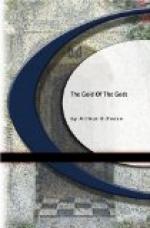Lockwood seemed eager to get away and, with a hasty glance at his watch, rose.
“If you wish to find me, I shall be with Senorita de Mendoza,” he said, taking his hat and stick, and bowing to us.
Whitney rose and accompanied him to the door in the outer office, his arm on his shoulder, conversing in a low tone that was inaudible to us.
No sooner, however, had the two passed through the door, with their backs toward us, than Kennedy reached over quickly and swept the contents of the ash-tray, cigarette stubs, ashes, and all, into an empty envelope which was lying with some papers. Then he sealed it and shoved it into his pocket, with a sidelong glance of satisfaction at me.
“Evidently Mr. Lockwood and the Senorita are on intimate terms,” hazarded Kennedy, as Whitney rejoined us.
“Poor little girl,” soliloquized the promoter. “Yes, indeed. And Lockwood is a lucky dog, too. Such eyes, such a figure—did you ever see a more beautiful woman?”
One could not help recognizing that whatever else Whitney might have said that did not ring true his admiration for the unfortunate girl was genuine. That was not so remarkable, however. It could hardly have been otherwise.
“You are acquainted, I suppose, with a Senora de Moche?” ventured Kennedy again, taking a chance shot.
Whitney looked at him keenly. “Yes,” he agreed, “I have had some dealings with her. She was an acquaintance of old Mendoza’s—a woman of the world, clever, shrewd. I think she has but one ambition—her son. You have met her?”
“Not the Senora,” admitted Craig, “but her son is a student at the University.”
“Oh, yes, to be sure,” said Whitney. “A fine fellow—but not of the type of Lockwood.”
Why he should have coupled the names was not clear for the moment. But he had risen, and was moving deliberately up and down the office, his thumbs in his waistcoat pockets, as though he were thinking of something very perplexing.
“If I were younger,” he remarked finally, of a sudden, “I would give both of them a race for that girl. She is the greatest treasure that has ever come out of the country. Ah, well—as it is, I would not place my money on young de Moche!”
Kennedy had risen to go.
“I trust you will be able to unearth some clue regarding that dagger,” said Whitney, as we moved toward the door. “It seems to have worried Norton considerably, especially since you told him that Mendoza was undoubtedly murdered with it.”
Evidently Norton kept in close touch with his patron, but Kennedy did not appear to be surprised at it.
“I am doing my best,” he returned. “I suppose I may count on your help as the case develops?”
“Absolutely,” replied Whitney, accompanying us out into the hall to the elevator. “I shall back Norton in anything he wants to keep the Peruvian collection intact and protected.”




